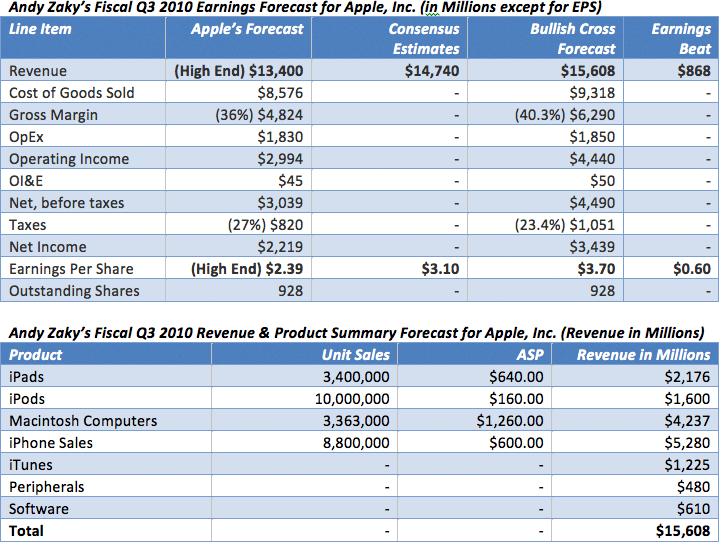Analysts polled by Thomson Reuters expect Apple to report about $3.10 in EPS on approximately $14.74 billion in revenue. Furthermore, analysts are generally looking for Apple to sell 8.35 million iPhones, 9.8 million iPods, 3.2 million Macintosh computers, and 3.3 million iPads.
Yet, a collection of nine financial bloggers polled by Fortune’s Philip Elmer-DeWitt, and who tend to regularly outperform Wall Street analysts are generally looking for far more impressive results than the street. The bloggers, according to Elmer-DeWitt, are looking for Apple to report about $3.64 in EPS on $15.67 billion in revenue (that’s a $1 billion beat on the Wall Street revenue consensus). The bloggers also expect Apple to report sales of 9 million iPhones, 9.9 million iPods, 3.33 million Macs and 3.32 million iPads.
Yet, based on the data I’ve analyzed over the course of the quarter, I’m looking for Apple to report closer in the neighborhood of $3.70 in EPS on $15.608 billion in revenue. I’m expecting Apple to sell 8.8 million iPhones, 10 million iPods, 3.363 million Macs, and 3.4 million iPads. The first table outlines my estimates relative to the consensus estimates and Apple’s forecast. The second table contains my revenue and unit sales estimates for Apple’s primary operations.
The big story this quarter, however, is whether Apple will surpass Microsoft in revenue for the first time in the company’s history. Analysts are generally expecting Microsoft (MSFT) to report $0.46 in EPS on $15.25 billion in revenue this quarter. That’s well below the $15.6 billion that the bloggers are expecting out of Apple when it reports this afternoon. If Apple does in fact report closer to what I’m expecting out of the quarter, then we’ll probably be watching history unfold when Microsoft reports this Thursday.
Though it appears this will be a strong report overall, there are still major risks of which investors should be aware. First, due to the collapse of the Euro this quarter, it’s possible that demand for Apple’s products overseas could have taken somewhat of a hit.
Secondly, it’s also likely that Apple will take a hit on the exchange rate leading to added margin pressure. Yet, Apple did note in its fiscal Q2 conference call that it is generally hedge for any potential future strength in the dollar. Still, it’s unclear whether Apple or any other company could have sufficiently anticipated the rather unusually sharp decline seen in the Euro this quarter due to the European sovereign debt crisis.
Another significant risk in this report is that Apple may potentially miss the street’s expectations on iPhone sales. Though the iPhone saw exceptional sell through in the quarter at the retail level indicating high demand for the device, Apple has been very slow at replenishing its channel inventory.
Financial Alchemist’s Turley Muller, who is generally known to be the most accurate analyst covering Apple, is modeling for an iPhone number well below the street. Muller expects Apple to report 7.8 million iPhones due in large part to stress in the channel - that’s 500,000 units below the street’s view. In fact, I’ve reduced my initial estimates from 9.3 million iPhones to 8.8 million units due to channel weakness.
If Apple does in fact miss on the iPhone number, it’s almost certain to lead to a major sell-off in the stock. It’s relatively easy to predict how the market will react to such news. The average fund manager, not fully understanding the difference between weakness in the channel and weakness in demand will see a low iPhone sales figure as simply being weakness in demand.
The market would likely dump the stock in spite of evidence suggesting that sales to the end user have actually been booming throughout the quarter clearly signifying robust demand for the device. The ongoing “antennagate†backlash also doesn’t help matters either. With Research in Motion (RIMM), Nokia (NOK), and Motorola (MOT) passionately attacking Steve Jobs’ attempt to deflect the reception problem of the iPhone 4 to the industry at large, the media is sure to keep this debate alive – and that’s exactly what these companies want.
Yet, though it’s possible that Apple might miss on the iPhone number due to weakness in the channel, I still think the weight of the evidence suggests that strong initial iPhone 4 sales will likely ameliorate the negative impact from weakness in the channel. And even if Apple does happen to miss on iPhone sales leading to short term weakness in the stock, it will present a good opportunity to dollar-cost average. Especially since weakness in the channel in this quarter will lead to stronger results in future quarters as that channel is replenished over the coming months.
Another story worth following in this report is the strength of Macintosh sales. My analysis of Gartner Research on worldwide computer sales seems to indicate that sales will fall between 3.3 and 3.4 million units. That far exceeds the 3.2 million Macs expected by the street. NPD data generally seems to confirm this view as well.
Finally, the most important issue worth following on the conference call is whether management will be able to provide any color on its plans to correct the current supply-demand imbalance going on with the iPhone 4. Apple is currently faced with major supply constrains not seen since the early days of the iPod nano.
This is evidenced by Steve Jobs’ comments during antennagate that Apple has only sold “well over†3 million iPhone 4s as of July 16 – that is tracking way behind analyst estimates for Q4. Apple sold 1.7 million iPhones in its first 3 days of sales, and only 1.3 million over the next 19 days. The run rate over that 19-day period is tracking far behind even the most conservative estimates.
In fact, if that run rate continues throughout the quarter, Apple would only sell 6.5 million units in Q4 – that’s well under the 11-12 million iPhone number expected by many analysts. In fact, I’m currently modeling for 11.5 million units. You can read more about this issue here.
Thus, it will be very important for Apple to address this issue head on in the conference call, and give some type of reassurance that it has plans to replenish its channel in a timely manner. For if this incredibly low run-rate continues for much longer, Apple may become at risk of missing Q4 iPhone sales estimates. As of now, this is merely an issue worth following, and I expect that it will be efficiently addressed given Apple’s incredible track record at problem solving. All in all, this should make for an interesting report.
Disclosure: At the time of this writing, the author holds no position in the equity markets.
 Andy M. Zaky, Bullish Cross, Special to AppleInsider
Andy M. Zaky, Bullish Cross, Special to AppleInsider







-m.jpg)






 Malcolm Owen
Malcolm Owen
 William Gallagher
William Gallagher

 Wesley Hilliard
Wesley Hilliard



 Christine McKee
Christine McKee


-m.jpg)




48 Comments
Yeah... I'm getting a little worried on Q4 guidance killing the stock. If they can't get iPhones into the channel quickly, they ARE going to lose sales. The Apple arrogance isn't sitting well with me either.
About all Apple could do to reinvigorate the stock is announce a Verizon iPhone (with a redesigned antenna). That, ot even T-Mobile or Sprint partnership.
Me... I need a new phone very soon, and it doesn't look like I will be able to get an iPhone.
At some point Apple has to become a victim of its own success. Now, instead of underestimating Apple's earnings the analysts are overestimating them. I guess I just don't understand the relationship between what an analyst predicts and how investors react. We all know Apple's numbers will be great yet if the results are lower than analyst's predictions the sky will fall. See the Google's results for example. And now the pundits are expecting Apple's revenues to exceed Microsoft too? And what if they don't?
Can anyone give me a reasonable explanation of why analysts have this kind of power in influencing stock prices? I'm looking at retirement in a few years and right now I see the stock market as nothing more than a fancy roulette wheel. I might as well just bury my 401K in a tin can in the back yard.
Yeah... I'm getting a little worried on Q4 guidance killing the stock. If they can't get iPhones into the channel quickly, they ARE going to lose sales. The Apple arrogance isn't sitting well with me either.
About all Apple could do to reinvigorate the stock is announce a Verizon iPhone (with a redesigned antenna). That, ot even T-Mobile or Sprint partnership.
Me... I need a new phone very soon, and it doesn't look like I will be able to get an iPhone.
Just STFU about arrogance, the antenna, and Verizon. Most of us are tired of the same bullshit being regurgitated daily. Just like the analysts poking around for the lamest reason to explain price moves the antennagate and Verizon crowd uses any downward movement to point the finger and say, "SEE, SEE, SEE!" It's all a crock and you know it.
At some point Apple has to become a victim of its own success. Now, instead of underestimating Apple's earnings the analysts are overestimating them. I guess I just don't understand the relationship between what an analyst predicts and how investors react. We all know Apple's numbers will be great yet if the results are lower than analyst's predictions the sky will fall. See the Google's results for example. And now the pundits are expecting Apple's revenues to exceed Microsoft too? And what if they don't?
Can anyone give me a reasonable explanation of why analysts have this kind of power in influencing stock prices? I'm looking at retirement in a few years and right now I see the stock market as nothing more than a fancy roulette wheel. I might as well just bury my 401K in a tin can in the back yard.
The price of the stock at any given moment reflects what is known and what is expected in the near and long term. The percentage of the stock price that represents "backward looking" data, or information that's already published, is much lower in a "growth" stock like Apple's. Much more of its perceived value is wrapped up in expectations about the next quarter, next year, and overall growth curves. Thus, the analysts' reports are being factored into the price all the time. If Apple reports actual numbers that are worse than those reports, it creates a downward discontinuity of expectations and creates a short-term freefall while new expectations are set.
If you want a stock that responds more reasonably to actual numbers, look into a non-growth stock where most of its value is in its perceived stability and annual dividends.
It's marginally better than a roulette wheel At least you can choose what stock you want your money on. But yes, it is sort of like gambling, except that you could actually come out ahead, unlike in casinos
OTOH, if Apple does report bigger revenues than Microsoft (and profit), then what will Steve Ballmer say now?